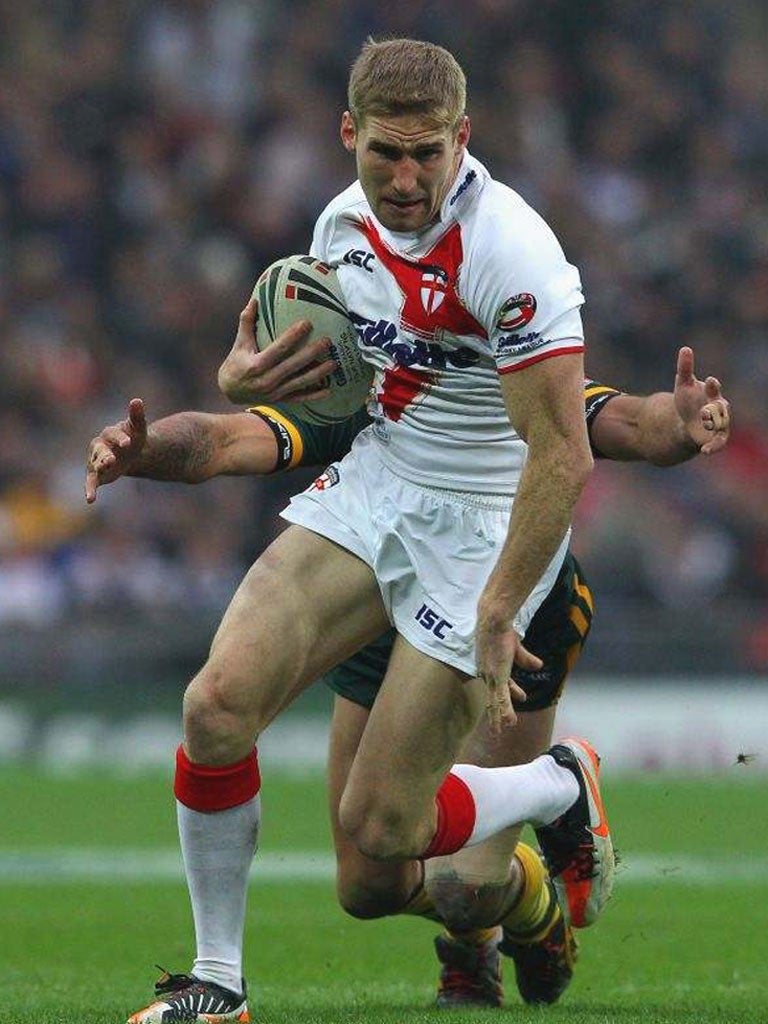Five things we learnt from the weekend's Four Nations
England impressed, says Dave Hadfield, and Sam Tomkins sparkled, but there is probably more to come from Australia...

Your support helps us to tell the story
From reproductive rights to climate change to Big Tech, The Independent is on the ground when the story is developing. Whether it's investigating the financials of Elon Musk's pro-Trump PAC or producing our latest documentary, 'The A Word', which shines a light on the American women fighting for reproductive rights, we know how important it is to parse out the facts from the messaging.
At such a critical moment in US history, we need reporters on the ground. Your donation allows us to keep sending journalists to speak to both sides of the story.
The Independent is trusted by Americans across the entire political spectrum. And unlike many other quality news outlets, we choose not to lock Americans out of our reporting and analysis with paywalls. We believe quality journalism should be available to everyone, paid for by those who can afford it.
Your support makes all the difference.1 Sam Tomkins is a genuinely world-class player and rugby league could not have afforded to lose him
Even in defeat at Wembley, the Wigan full-back was the most skilful and exciting player on the pitch. His two backhanded flick-passes which led to England tries were exquisite. His broken-field running often had the Aussies in a panic and his defence was strong – which couldn't always be said of everyone in front of him.
Rugby league produces such good players that some of them are bound to be lured by a wealthier code. Most of the losses, like Chris Ashton, Kyle Eastmond, and Sam's brother, Joel, it can cope with. To lose Sam Tomkins, however, would have been the most depressing development since the free gangway made such moves inevitable.
2 It is worth taking big matches to Wembley after all
The calculated gamble on getting enough of a crowd to make the stadium look and feel OK was justified by a 42,000 attendance.
The quality of the games – Wales showed enough sheer doggedness against New Zealand to stop the first game descending into farce – deserved more, but you don't always get what you deserve. Besides, the impact of the event should not be measured solely at the turnstiles. The Four Nations and the code in general got more positive publicity than they would ever have done in the North and it all tied in neatly with the relaunch of the London Broncos as the Super League presence in the capital.
Around a third of the tickets sold in advance were sold in the South. Even allowing for the London-based Aussies and Kiwis, that proves that there is an untapped market for the Broncos to connect with.
3 A major game needs an experienced referee
Henry Perenara seems a nice bloke. He has the advantage of recently playing the game at first-grade level and he handled the England-Wales match the previous weekend without any dramas.
But he has only officiated in a handful of NRL games and, on Saturday, it showed. He was strict with England at the play-the-ball, not so much so with Australia. He bottled out of showing a card to Tony Williams for the game's worst tackle. Never mind that Ben Westwood has said he was play-acting, the intent and the impact were both there.
Worst of all was the double-think over the double-movement. If he had gone to the video referee, Tom Briscoe's try would have been allowed. Insult was added to injury when he went to the screen and gave one to Chris Lawrence.
You don't have to subscribe to Steve McNamara's rather paranoid theory that he was "got at" by Aussie pressure. He was just out of his depth.
4 England are capable of beating New Zealand
OK, they eventually lost to Australia by 16 points, but not since Melbourne in 1992 have they looked as consistently dangerous against them.
They played a hugely enterprising brand of rugby and were always liable to make breaks. With a bit of fine tuning, they can certainly do the same against the Kiwis.
Then it will be a question of whether they can cut down on the daft mistakes. No more short kicks from the 20-metre line, if you please. And it goes without saying that they will need to make the key tackles, several of which were missed at Wembley.
5 The problem is that there could be better to come from Australia
Even without the injured Billy Slater, they have Darius Boyd to slot in at full-back – and he is almost as good. Greg Inglis will be better for the run at Wembley and Darren Lockyer's dodgy shoulder will have had two weeks' rest.
We haven't yet seen the best yet of the new wingman, Akuila Uate, but Elland Road could well be his stage.
Meanwhile, the mobile and athletic Australian pack will be as formidable as ever. Take the case of Paul Gallen, a loose forward redeployed as a prop.
We're pretty happy with our front row at present – subject to injury news this week – but we could be looking at the future.
Join our commenting forum
Join thought-provoking conversations, follow other Independent readers and see their replies
Comments